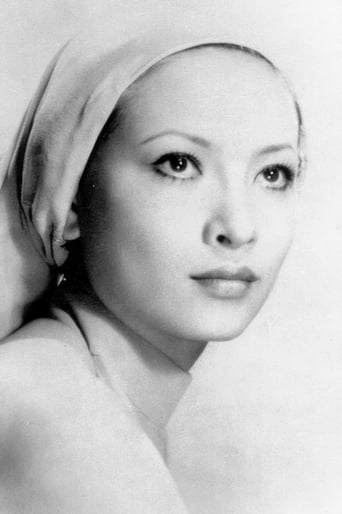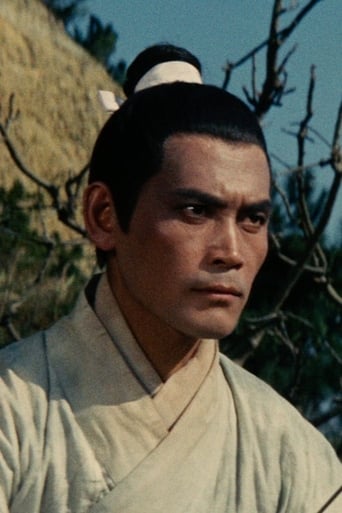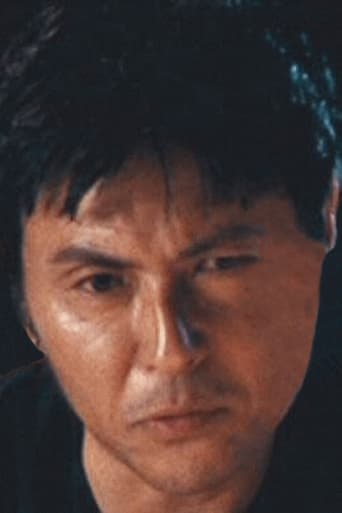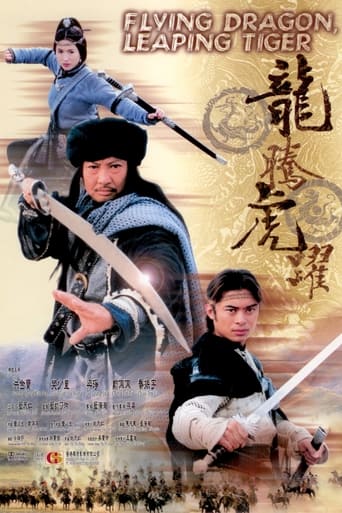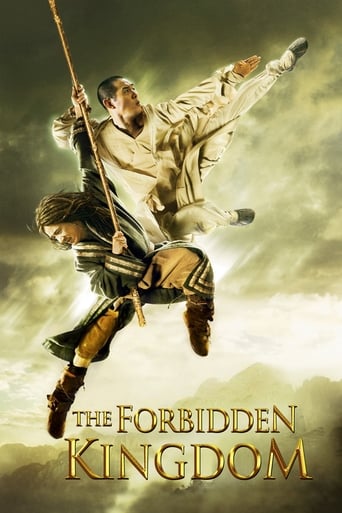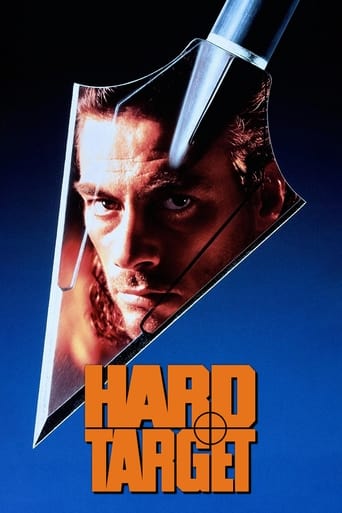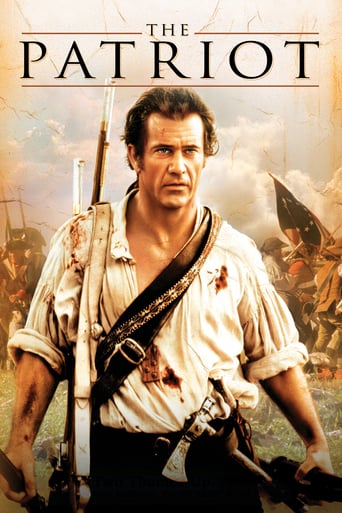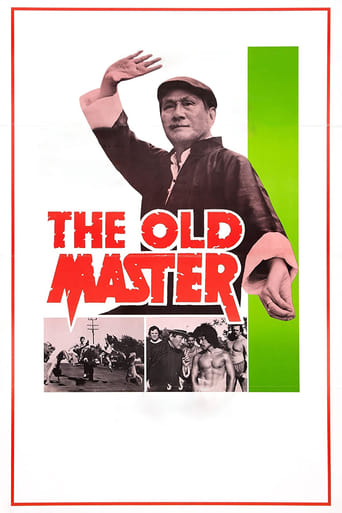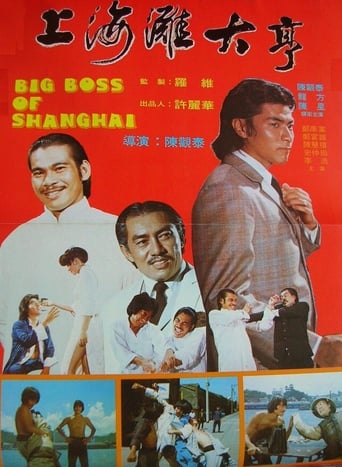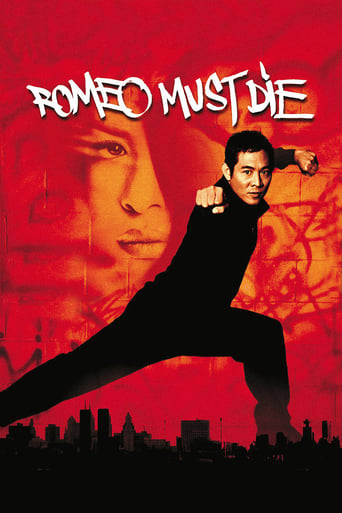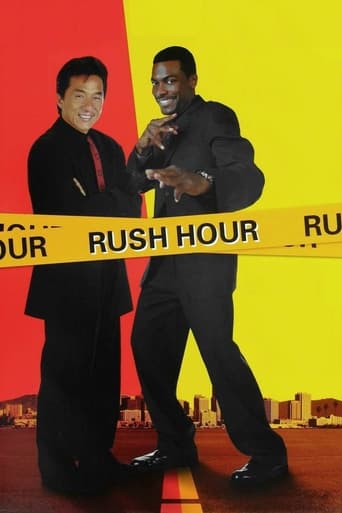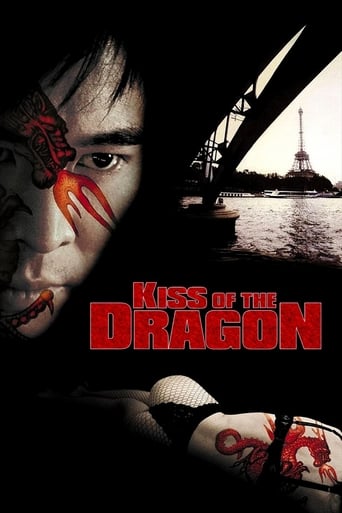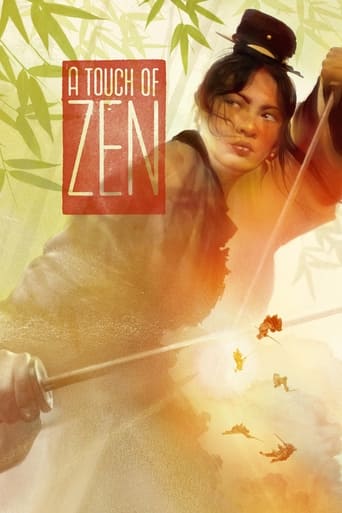
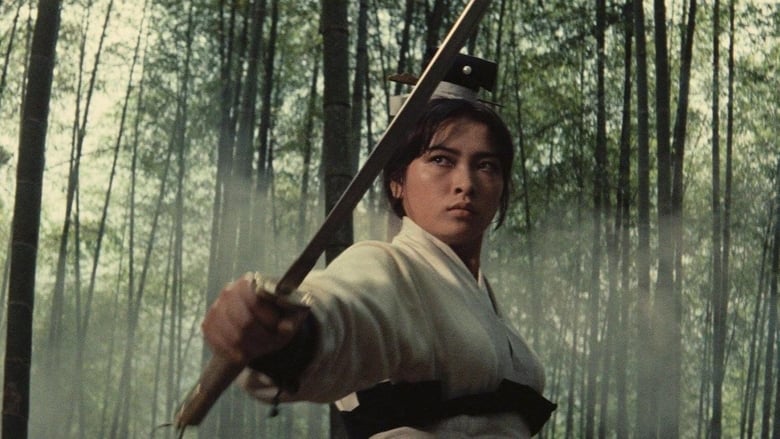
A Touch of Zen (1971)
Ku Shen Chai, an artist in his early 30s, still lives with his mother, but he is suddenly shaken by the arrival of Yang Hui-ching, a mysterious princess on the run. Yang brings Ku into her circle of protectors, including a nameless monk whose spiritual guidance transforms him into a valiant fighter.
Watch Trailer
Cast
Similar titles
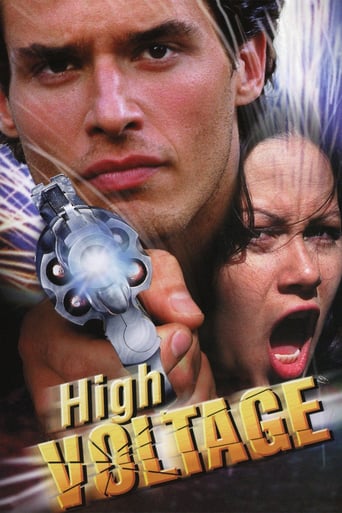
Reviews
Too much of everything
Instant Favorite.
This story has more twists and turns than a second-rate soap opera.
One of the most extraordinary films you will see this year. Take that as you want.
Apparently this is a big deal in the wuxia niche, proof there is more to these films than simple chop socky and that they can paint sunsets and sweep us to them like the best of films. I have no vested interest in wuxia, though I have passed through a Shaw Bros phase; what brings me here is Zen, beautiful, madcap Zen.Although I follow a different branch of Buddhist practice, I am grateful for Zen tradition. We may find elsewhere similar notions of emptiness as the essence of form, but none that sing what it means to be fully, vitally empty with the passionate ardor of Zen.The great Sufi love poets like Rumi also approached the mystery of what it means to unveil the world rather than explain it, but what awareness graced them was intuitive, desert inspired. Tao addressed the reflections of the cosmos in the evening dewdrops, what it means to look at a flower looking back at us, but that unity of far and close is enclosed in a perfect circle of yin-yang. Zen by contrast blossoms in the asymmetry of what spontaneously arises and disappears; and what the Zen Masters so eloquently talk about is what they have personally awakened to through their ardent practice of silence. The Enso circle that symbolizes this Awakening is often deliberately painted crude, as pointing to the imperfection of form it embraces.So we have here a sweeping affair of political intrigue and unjust persecution in a China of empires. All this is in tacit understanding that these hierarchies will come to pass, like their forebears. The film after all opens in a deserted fort, in the mansion of a general ruined by civil war. Possibly this depiction of a corrupt aristocracy blinded the censors of the time to what it actually reflected of their own regime. Czech filmmakers were masters of this ubiquity, by situating their griefs with Soviet tyranny against a not-so-distant Nazi oppressor.But the film is not content with this, which after all the Japanese had delivered decades ago in much more refined form. So what is the Zen touch here? Although it's adequate as the former, here the film completely breaks apart. It's not enough that the Buddhist monks are made to be little more than godly vehicles who conveniently show up at the right moment to aid the oppressed with their superhuman abilities of kung fu (which is after all a valid extension of Zen practice), or whatever it is that these monks represent is reduced to the status of benevolent protectors.What is actually surprising is that none of the characters who are met with this way of life are imparted with anything. What perfect opportunity squandered for example, to make the young portrait painter realize that 'knowledge' and 'wisdom' are not to be found in books. And how is it that the two fugitives leave the monastery with only the knowledge of deadly kung fu and none of the compassionate mind to control it?It is not surprising then that this kind of film, that has reduced everything to appearance and platitude, would go on in the end to actually depict nirvana. The image intended to be transcendent transcends nothing, not merely because nirvana is a state of mind beyond words, but because ultimately there is nothing to transcend. Whatever mock transcendence in the image of the Buddha we find here means nothing.
I rented this movie from Netflix. The DVD shows it in letterbox format with bright white English subtitles in the lower black space. The quality of the print that was used to make the disc is good for outdoor action, but the action in two long night scenes is so dark as to be mostly invisible.Obviously a lot of people love this film, but I'd give it only 7 out of 10 because it's way too long, over 3 hours. It was shown in theaters in the early 70's as Part I and Part II on separate days, which would be okay except the climactic fight in the bamboo forest which ends Part I is repeated in entirety in Part II. And there are other sequences which could be trimmed back. Towards the beginning, for example, Scholar Ku makes a long, long annoying nocturnal investigation of the spooky old mansion where he lives with his mother, finding nothing. Because the print is so dark, we see nothing as well. Again, in Part II, after the heroes have tackled the evil forces of the Eastern Chamber (a never-explained reference to some part of the Imperial Palace, I suppose), Scholar Ku wanders around the battle site laughing humorlessly over his own cleverness in the ways he spooked the Imperial guard force that came to attack. A little of this stuff goes a long way.Nonetheless, it's a good Netflix rental. I particularly enjoyed seeing Pai Ying in a heroic role as Gen. Shih, and hawk-faced Miao Tien as the evil Commandant's lieutenant. It was also interesting to see 1970's Taiwanese hero actor Tien Peng (often billed as "Roc" Tien) as a handsome official of intermediate strength and skill working for the evil Eastern Chamber people. And I loved Ku's mother.Two other people deserve honorable mention. The Chinese title "Hsia Nü" means "gallant lady", according to the subtitles, but lead actress Hsü Feng is hard to warm up to, and usually seems off-putting rather than gallant. She never smiles in this film or shows any emotional content when she fights. The other interesting person is Chiao Hu (often billed as Roy Chiao), who plays the Buddhist monk that injects the Touch of Zen. Chiao was always a likable actor, but he too never smiles or seems like anything but a chilly person here. In both cases, however, their demeanor is perfectly appropriate to the roles, so I didn't mind that.And was that Sammo Hung in a bit part, supporting the evil general Hsü in the final struggles?
Let me first say that this film is indeed a work of art - it is lyrical, spiritual and visually intriguing. However, as an action film I'm not entirely convinced. The fight scenes are nothing that special, though they are exceptionally well filmed, and our heroes leap around the screen in a way that doesn't seem inappropriate or false - you believe in the world of these people. But it is an extremely clever film and undoubtedly a highlight of Eastern cinema. The character development of Ku, is particularly impressive - initially refusing to grow up and take on responsibilities such as marriage, and eventually becoming a cunning freedom fighter and protector of a child. Unfortunately the other characters are too opaque, too much like ciphers, to really sympathise with. The development of genres is also very interesting, with the film starting out as a kind of ghost story and becoming a thriller with artistic and spiritual elements. If you are looking for lots of action and the kind of over-the-top antics we expect from Hong Kong, then don't look here. If you want to see stunning scenery, a languid but atmospheric pace, and beautiful images such as the sun rising over the silhouettes of Buddhist monks, then enjoy.
Touch of Zen is one of those movies that are on a class and genre of their own and probably never in the movie history will find their match. King Hu certainly lived up to his name, when crafting this piece of art that deserves even more respect and admiration than it has already had.Blending different genres seamlessly together and paving the way for many movies to come, everything here is well balanced and thought over. The story that begins as a ghost story starts slowly but rewardingly layering up, developing and getting more dimensions, moving into Wu Xia styled action and politics drama, then leaping into the territory of Seven samurais -style tactical warfare depiction, finally getting some deeply mystical aspects in the end. Settings and photography are stunningly beautiful, and all the visuals are breath-taking timeless.Looks like time simply cannot touch this movie, and that's why I compare this one to the works of Sergio Leone. Definitely one of the best movies I have ever seen. Now, if only my wish come true and we had some day better than watchable DVD release of this true classic, preferably fully restored from original film. One can only hope...This is my truth. What is yours?
